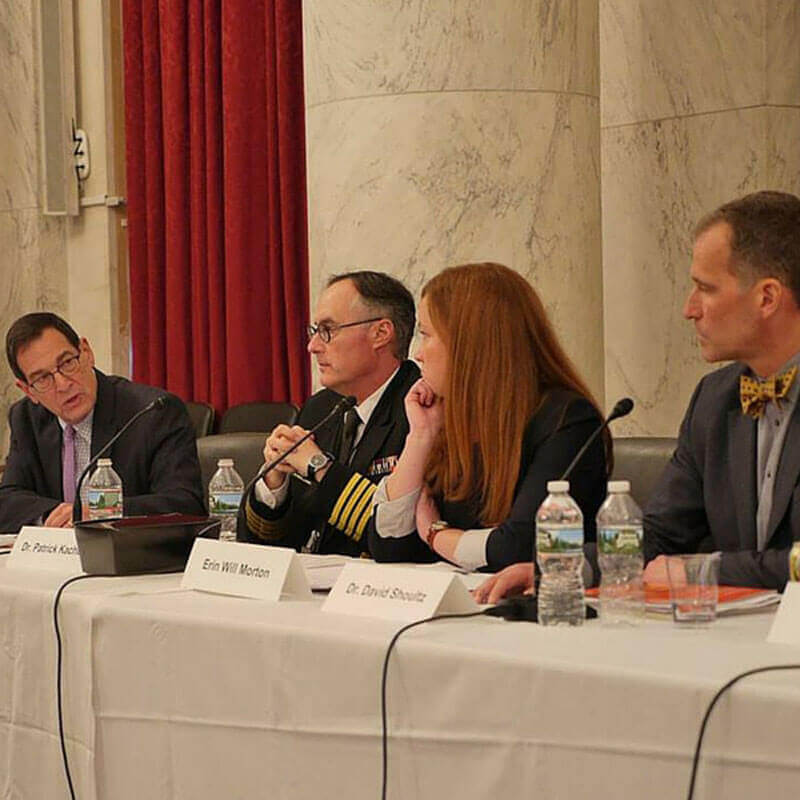Kat KelleyGHTC
Kat Kelly is a senior program assistant at GHTC who supports GHTC's communications and member engagement activities.
On Tuesday, GHTC launched our seventh annual policy report through a congressional briefing and panel discussion. The critical role played by the US government in catalyzing global health research and development
(R&D) was a recurring theme, as panelists discussed the interconnectedness of global and American health and emphasized the need for new health
tools to protect against outbreaks and continue progress.
As moderator, GHTC Director Erin Will Morton opened the briefing, reminding attendees that despite the landmark progress achieved in global health over the past fifteen years, the US government must continue to invest in health R&D to achieve the next milestones in global health. “Goal setting works. And R&D for new technologies is key to achieving global health goals,” said Morton.
Morton emphasized how past investments have had a remarkable impact, highlighting that the neglected disease pipeline has grown from 365 products under development in 2012 to 485 in 2015. However, as the GHTC policy report points out, US funding for global health R&D has stagnated or declined since 2009, and with the exception of the emergency funding for Ebola, 2014 funding levels were down 13 percent. “Our dollars are best spent when [US] agencies are working closely together,” said Morton, highlighting three goals the US government should embrace to advance innovation, as detailed in the report, including the importance of sustainable, long-term funding and innovative financing mechanisms; improved coordination of global health R&D efforts across US agencies; and streamlined and strengthened regulatory pathways.
Panelist Dr. Peter Hotez—president of the Sabin Vaccine Institute and US science envoy—reiterated the need for long-term, sustainable funding for global health R&D, noting that the science to develop an Ebola vaccine was first published in 2013, but the technology sat there and was not advanced to product development because Ebola is a neglected disease and the technology offered little financial incentive to the private sector. He emphasized the role of US government investment in catalyzing health research, noting that when the US government “stepped in” and put up more than US$100 million to develop an Ebola vaccine, three leading pharmaceutical companies joined in.
Dr. Hotez called for new actors, partnerships, and innovative models to advance R&D, lamenting that “our technical ability to make these innovations has outpaced our social, political, and financial instruments.” Further, Dr. Hotez challenged the notion that neglected tropical diseases (NTDs) are restricted to low- and middle-income countries, noting that 70 percent of NTD cases occur in G20 countries and that “there are 12 million Americans living in poverty with a neglected disease,” adding that neglected diseases are common but are “mostly striking the poor, mostly people of color, more in the American South.”
 Ambassador Jimmy Kolker discusses how HHS work contributes to both helping individuals overseas and protecting the health of Americans. (Photo: GHTC/Marissa Chmiola)
Ambassador Jimmy Kolker discusses how HHS work contributes to both helping individuals overseas and protecting the health of Americans. (Photo: GHTC/Marissa Chmiola)
The other panelists concurred, echoing that global health is American health. Panelist Dr. Patrick Kachur—principal deputy director of the Center for Global Health at the US Centers for Disease Control and Prevention (CDC)—made clear that CDC’s global health work is grounded in the agency’s responsibility to protect Americans. Ambassador Jimmy Kolker, assistant secretary for Global Affairs at the US Department of Health and Human Services (HHS), added that “over the next 50 years, the cost of lives and money to the global system of the threat of terrorism, climate change, and epidemics is in the same ballpark,” however, noting that what the US government is investing in fighting terrorism and climate change “so far outstrips what we’re doing in terms of outbreaks and epidemics.”
Dr. Kachur called for enhanced coordination, stating “R&D is a whole-of-government and cross-sector affair.” Panelist Dr. David Shoultz—global program leader for Drug Development and Devices and Tools at PATH—furthered this point, noting that “innovation takes place within an enabling ecosystem, and in our context, that enabling ecosystem involves the NIH [National Institutes of Health], the FDA [Food and Drug Administration], HHS, the CDC, our close colleagues and friends at other product development partnerships, and private-sector participants.”
In closing, Ambassador Kolker argued that the US government must continue to invest in R&D and consider “how the public sector can be the enabler of the private sector,” both to develop new health tools and to ensure the United States keeps its “competitive edge” as a leader in science and innovation. Dr. Shoultz agreed, stating that “US leadership [in global health] has mattered, it continues to matter, it will matter” in an increasingly globalized world and that investing in health research and innovation is “enlightened self-interest.”
To watch the entire discussion, see below: